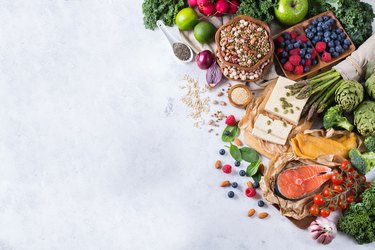
The legs may be an athlete's greatest asset. When combined with the abdominal musculature and the right food for strong legs, these core muscles power most sport movements. As a result, athletes are constantly searching for more effective ways to build and strengthen their leg muscles.
The combination of a balanced diet, rest and a progressive scientific weight training regimen that targets the lower body is the quickest route to stronger and more powerful leg muscles. The following foods for leg muscles are great components of a diet meant to build the body's lower half.
Video of the Day
Video of the Day
However, no food contributes solely to muscle development in the lower body. The legs grow larger in comparison to other parts only when training is focused on the lower extremities.
An Ideal Mix
Standard nutritional adages apply when choosing foods for strong legs. You need the right combination of macronutrients that allow the body to build stronger and more powerful leg muscles.
According to the Academy of Nutrition and Dietetics, protein is essential and should comprise about 10 to 35 percent of total calories. Carbohydrates should remain the predominant macronutrient; complex carbs are preferred over simple carbs but both are needed. About half your calories should come from healthy carbohydrates, such as whole grains, low-fat milk, fruits and vegetables.
Fat should be used in moderation, totaling about 25 to 30 percent of your overall diet. Monounsaturated and polyunsaturated fats should make up most of the fat allotment.
In order for the body to build muscle, athletes also must exceed their caloric requirements by about 10 percent. An online calculator can help you estimate how many calories you need based on your personal stats and goals. The following meals are examples of food for strong legs that build muscle when combined with rest and a lower-body training regimen.
1. Grilled Chicken with Salad
Lean white chicken breast is an ideal food for leg muscles. It adds protein without the fat of dark meat.
Salad greens and mixed colored vegetables provide antioxidants to help the body recover from training sessions. Olive oil and avocado provide heart-healthy fats when portioned appropriately.
2. Grilled Salmon with Rice and Vegetables
Like many fish, salmon packs protein, according to the U.S. Department of Agriculture National Nutrient Database. It also contains omega-3 and omega-6 polyunsaturated fats.
Brown rice and vegetables are also ideal foods for leg muscles. They provide the carbohydrates needed to sustain energy throughout training, plus antioxidants to recover.
3. Buffalo Steak with Yams
Like beef, bison provides a high amount of protein — about 17 grams — but it has half the fat of beef. Yams and other vegetables provide energy for training and antioxidants for recovery.
4. Turkey and Swiss Sandwich
Turkey and chicken are low in fat and high in protein. Swiss cheese is lower in fat and can be added for flavor. Add whole wheat bread, pretzels and bananas to fuel your workouts.
Read more: What Is the Healthiest Deli Meat?
5. Tuna Salad Sandwich
Tuna salad is a great source of protein that can be made healthy by limiting the amount of mayonnaise in the recipe. It should be dry. Complex carbs are provided via whole wheat bread.
Add carrots and apples on the side as sources of antioxidants, vitamins and minerals needed for recovery.
6. Egg White Omelet
Egg whites are full of protein. Combined with vegetables sautéed in olive oil, they provide good sources of fat and carbs.
Have a slice of whole wheat toast on the side for your complex carbs, plus oranges for vitamin C to aid recovery.
7. Bran Cereal With Skim Milk
Bran provides complex carbohydrates to power your day. Skim milk provides protein and can be supplemented with the addition of protein powder. Flaxseed can be added to provide heart-healthy fats.